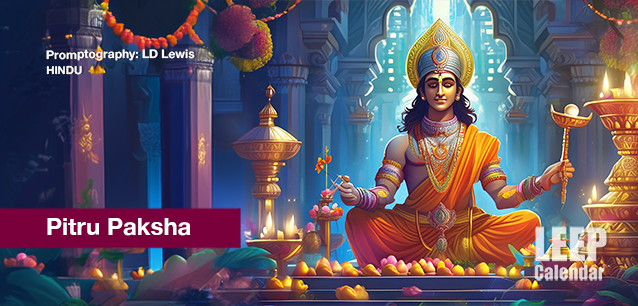 AD
AD
Today is: November 05
Scroll to explore events active on this date.
Additional Events on LEEP
LEEP INK FEATURES

August? Absolutely!
In August, we live through the Dog Days of Summer. It's hot and often humid, and those who can leave for better climates do. Down south, winter is in full force. August is also known as "the ...

In The Heat of July: July 2025 Events
Is it hot enough (or cold enough if you're below the equator) for you yet? There is actually a day for that! Like every month, I pick a diverse collection of events you may or may not know about. This ...

May Blooms: Events in May 2025
Along with October, May is one of the most densely packed months of the year. It's before the summer humidity and the last whole month of the school year. The weather is warming in t...
About Pitru Paksha
Family & Friends , India
Ends: Oct 09, 2026
DESCRIPTION:
ABOUT THE HINDU OBSERVANCE OF PITRU PAKSHA
Pitru Paksha, a significant fortnight-long observance in Hindu culture, is dedicated to honoring deceased ancestors. This period, also known as Shraddha, involves a series of rituals and offerings to ensure the peace and well-being of departed souls.
Pitru Paksha typically falls in the lunar month of Bhadrapada, usually in September or October. During these 16 days, Hindus perform rituals such as Tarpan (offering water), Pinda Daan (offering rice balls), and feeding Brahmins (priests) and the poor. These customs seek to appease the ancestors' souls, ensuring their blessings for the living family members.
The history of Pitru Paksha is rooted in ancient Hindu texts, including the Mahabharata, which mentions that the great warrior Karna was granted access to the heavenly realms only after performing Shraddha rituals for his ancestors. This practice emphasizes the importance of paying homage to one's forebears in Hindu tradition.
Pitru Paksha holds immense significance in Hindu culture as it strengthens the bond between the living and their ancestors. It is believed that performing these rituals with devotion can mitigate any negative karma passed down through generations and bring prosperity and peace to the family. This underscores the collective responsibility of the living family members to ensure the well-being of their ancestors' souls.
During Pitru Paksha, Hindus revere Yama, the god of death, and the Pitrs, or ancestral spirits. By honoring these deities and performing the prescribed rituals, devotees seek to ensure that their ancestors' souls attain moksha (liberation) and that their lives become blessed with happiness and success.
Pitru Paksha, a deeply respected and widely observed event in Hindu culture, reflects the enduring reverence for ancestors and the profound belief in the cyclical nature of life and death. This belief is a cornerstone of Hindu philosophy and is deeply embedded in the observance of Pitru Paksha.
VIDEOS
SUPPORTING DOCUMENTS
Currently, this event does not have supporting documents.
ADDITIONAL IMAGES
Currently, this event does not have supporting images.
Where would you like to go now?
 AD
AD


/footer-logo.svg)
